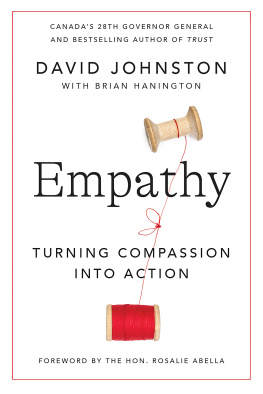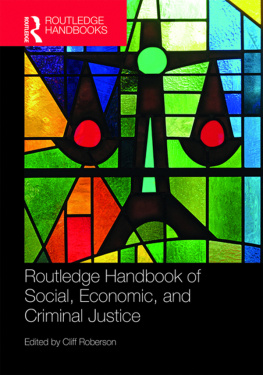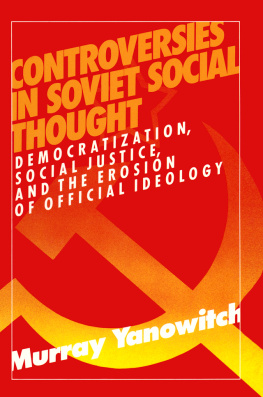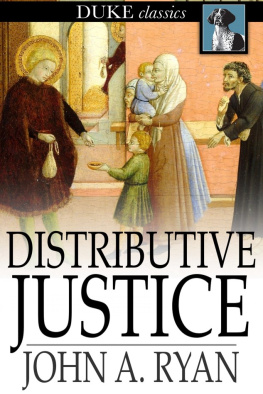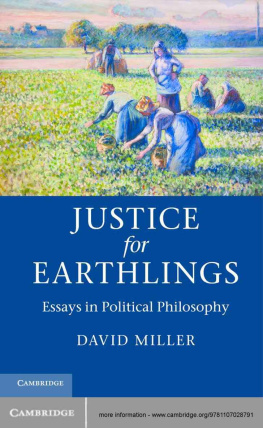Brief Histories of Philosophy
Brief Histories of Philosophy provide both academic and general readers with short, engaging narratives for those concepts that have had a profound effect on philosophical development and human understanding. The word history is thus meant in its broadest cultural and social sense. Moreover, although the books are meant to provide a rich sense of historical context, they are also grounded in contemporary issues, as contemporary concern with the subject at hand is what will draw most readers. These books are not merely a tour through the history of ideas, but essays of real intellectual range by scholars of vision and distinction.
Already Published
A Brief History of Happiness by Nicholas P. White
A Brief History of Liberty by David Schmidtz and Jason Brennan
A Brief History of the Soul by Stewart Goetz and Charles Taliaferro
A Brief History of Justice by David Johnston
This edition first published 2011
2011 David Johnston
Blackwell Publishing was acquired by John Wiley & Sons in February 2007.
Blackwell's publishing program has been merged with Wiley's global Scientific, Technical, and Medical business to form Wiley-Blackwell.
Registered Office
John Wiley & Sons Ltd, The Atrium, Southern Gate, Chichester, West Sussex, PO19 8SQ, United Kingdom
Editorial Offices
350 Main Street, Malden, MA 02148-5020, USA
9600 Garsington Road, Oxford, OX4 2DQ, UK
The Atrium, Southern Gate, Chichester, West Sussex, PO19 8SQ, UK
For details of our global editorial offices, for customer services, and for information about how to apply for permission to reuse the copyright material in this book please see our website at www.wiley.com/wiley-blackwell .
The right of David Johnston to be identified as the author of work has been asserted in accordance with the UK Copyright, Designs and Patents Act 1988.
All rights reserved. No part of this publication may be reproduced, stored in a retrieval system, or transmitted, in any form or by any means, electronic, mechanical, photocopying, recording or otherwise, except as permitted by the UK Copyright, Designs and Patents Act 1988, without the prior permission of the publisher.
Wiley also publishes its books in a variety of electronic formats. Some content that appears in print may not be available in electronic books.
Designations used by companies to distinguish their products are often claimed as trademarks. All brand names and product names used in this book are trade names, service marks, trademarks or registered trademarks of their respective owners. The publisher is not associated with any product or vendor mentioned in this book. This publication is designed to provide accurate and authoritative information in regard to the subject matter covered. It is sold on the understanding that the publisher is not engaged in rendering professional services. If professional advice or other expert assistance is required, the services of a competent professional should be sought.
Library of Congress Cataloging-in-Publication Data
Johnston, David, 1951
A brief history of justice / David Johnston.
p. cm. (Brief histories of philosophy) Includes bibliographical references and index.
ISBN 978-1-4051-5576-2 (hardback) ISBN 978-1-4051-5577-9 (paperback) 1. Justice (Philosophy)History. 2. Social justicePhilosophy. I. Title.
B105.J87J65 2011
1720'209dc22
2010051056
A catalogue record for this book is available from the British Library.
This book is published in the following electronic formats: ePDFs 9781444397536; Wiley Online Library 9781444397550; ePub 9781444397543
For
Charles E. Lindblom
Scholar Mentor Friend and for the students and staff of Introduction to Contemporary Civilization
Acknowledgments
This book grew out of a longstanding dissatisfaction with contemporary academic thinking about justice, and especially with the estrangement between that thinking and a sense of justice that has been, and remains, widely shared across many cultures since the earliest times of which we possess written records. In order to pierce the academic bubble within which scholarly conversation about justice has been contained for at least the past several decades, I have immersed myself over the past few years in texts, both celebrated and relatively obscure, in an effort to recapture the various sensibilities that have motivated people's ideas about justice over the centuries. I hope that the results of this effort will cast some light on the idea of justice itself, as well as unearthing evidence for a history of ideas, some of which have long been either forgotten or summarily and unjustifiably dismissed.
This is a concise book, but it covers considerable territory, especially of the chronological sort. In order to make the narrative and arguments as accurate, clear, and incisive as possible for this subject, I have freely sought advice from others, and have accordingly acquired many debts. Danielle Allen, Robert Goodin, Ira Katznelson, Jennifer Pitts, Thomas Pogge, Melissa Schwartzberg, Annie Stilz, Katja Vogt, Jeremy Waldron, Gareth Williams, Jim Zetzel, and the members of the Columbia Seminar on Studies in Political and Social Thought, especially Jerry Schneewind, all have read and made suggestions on at least one and as many as four of the book's chapters. This book is a much better product than it would have been without their help. Luke MacInnis made suggestions for Chapter 6, Liz Scharffenberger helped to refine my understanding of a passage in Chapter 2, and Isaac Nakhimovsky assisted me on the Epilogue. David Londow asked the students in his lecture course on Justice at the University of California at Berkeley in the fall of 2009 to read the chapters and gave me useful and encouraging feedback toward the end of that semester.
Wendy Johnston read each chapter as it was being completed. Her advice has contributed a great deal to the clarity of the final product. Bryan Garsten generously took time to read the entire script when it was near completion and offered valuable suggestions, which have contributed significantly to the quality of this book. I am also the grateful beneficiary of reports from two readers for Wiley-Blackwell who were not identified to me, but who provided both strong encouragement and thoughts that helped me sharpen the script. Katherine Johnston proofread the entire text with me.
I wish also to thank Nick Bellorini, the editor at Wiley-Blackwell who cajoled me into agreeing to write this book and worked with me in its earlier stages, and Jeff Dean, who has served thoughtfully and effectively to help shepherd the project to completion. Andreas Avgousti gave me valued research assistance, useful suggestions, and a great deal of help in the preparation of the source notes and glossary. Elisa Maria Lopez provided much appreciated help in assembling and organizing materials for the final editing and correcting of the script and source notes. Manuela Tecusan gave me a great deal of valuable assistance in fine tuning the final text; she offered substantive corrections and additions to the text, for which I am very grateful. I should like also to express appreciation to the Warner Fund at the University Seminars at Columbia University for its help in publication. Material in this work was presented to the University Seminar on Studies in Political and Social Thought.
I have had the privilege for the past eight years of serving as Director and Chair of the Governing Board of the Society of Fellows in the Humanities at Columbia University. The Society, and the Heyman Center in which it is housed, provided an environment for conceiving and compose this book that has few peers in collegiality and intellectual stimulation. I wish also to thank the numerous students and teaching assistants who have been through the mill of my lecture course on justice since I began teaching it, in the spring of 2001. I would not have been able to write this book if I had not had the opportunity to work through many of the ideas there first, in a rough and tentative way.
Next page


